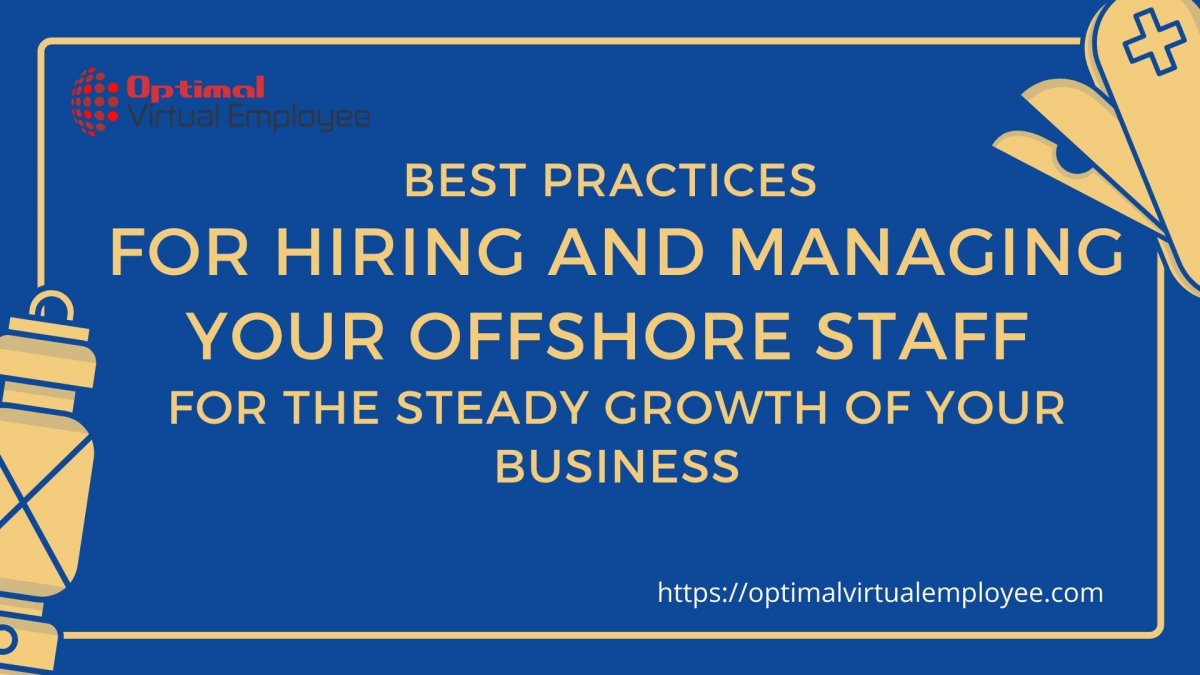Modern offshore staffing service providers are known to provide increasingly sophisticated alternatives to established businesses. Primarily, the potential to achieve significant savings through offshoring work is the biggest factor that prompts companies to go down the route.
However, given the scale, investment, and potential for the risk involved in embarking upon outsourcing projects, some businesses remain skeptical about it. Companies are deterred by the obstacles and complexities involved in offshore staffing. But a company that relies on best practices for offshore team management emerges as a winner.
List of Best Practices for Hiring and Managing your Offshore Staff
-
Always hire offshore staff after analyzing their development methodologies.
It’s prudent for businesses to rely on virtual employee services that leverage a development methodology that is in line with the ones they use in-house. Make it a point to hire virtual employee services that follow transparency in their procedures and are adept at issue resolution, in case it occurs. Any virtual employment solutions employed after thoroughly discussing the expectations, requirements, and responsibilities would be successful in executing the desired outcome and fruitfully add to the ROI of the business.
2. Control management is a crucial component of offshore staffing.
When you hire virtual employee management best practices, include pre-defining roles and responsibilities of the offshore partners. Companies that thoroughly evaluate the scope and amount of control passed on to the offshore partner in advance; often achieve their desired objectives. Further, it’s essential to discuss the roles, responsibilities, expectations, challenges in detail to eliminate any chances of ambiguity between in-house and offshore teams.
3. Communication and rapport building allow alliance management during offshore staffing.
Establishing open communication lines with the team at virtual employment solutions providers can yield valuable rewards. Discuss your company’s vision and ideas for a particular project to help the offshore team understand its goal. Communicating and agreeing on the parameters and expectations for a project minimizes the chances of misunderstanding. Effective communication is thus the primary collaborative effort that you must put in when working with any offshore partner. Making the outsourcing organization team feel included can help a business realize better performance.
4. Indulge in timely conflict management when you hire virtual employee services
Conflict is an inherent byproduct of all organizations or social structures, and it may raise its ugly face in case of collaboration with offshore teams. Businesses must hire offshore staff only if they can indulge in proper conflict management through thorough communication and maintain a healthy work environment. It’s common for conflicts to arise due to cultural differences, differing perspectives, language barriers, and personality differences in offshore teams. Provide opportunities for constant dialog, and be open to opinions and allow scope for productive discourse to improve distressed situations.
5. Leverage time zone differences when you hire virtual employee services
Most offshore teams are located in time zones that are different than that of the business that hires them. When a company decides to hire offshore staff solutions, they may be concerned about time zone differences and an underlying fear of facing challenges in collaboration. However, what you see as a challenge can instead be a huge advantage for your business. Having an offshore team that is working ahead of you, allows you a significant time frame to review their work and adjust the work and plan accordingly.
6. Transition Management supports healthy workflow when you hire offshore staff
When outsourcing or offshoring your workload to a remote team, smooth transfer of services from a legacy organization to a vendor organization on the contractual requirements never comes easy. The transition process begins on the service commencement date and lasts until the vendor has reached the “steady-state” of maturity defined as per the contract. Businesses that have a robust transition management process for their engagements are likely to succeed with offshoring. They must set up program management teams with representation from both parties to plan and fulfill requirements, identify and resolve risks and issues, and include effective reporting mechanisms.
7. It’s essential to ensure smooth operation when you hire offshore staff for your business.
It incurs some time to move from the unsettling transition phase to the steady operational mode during offshore staffing. Formalizing an offshore relationship creates transparency about management costs, roles, and responsibilities. However, as clients gain experience and learn things, they may feel a need to change something in the agreements and add features. Additionally, unforeseen requirements may arise during the process in this stage of the relationship. Thus, change (request) management and incident management allows smooth operations during offshoring.
Conclusion
With offshore team management, many businesses stand to improve their revenues. Just follow these best practices to hire and manage a dedicated team of professionals remotely.









